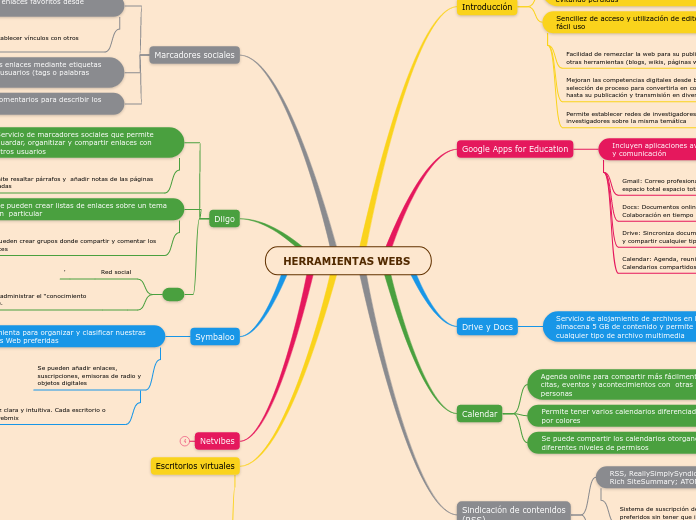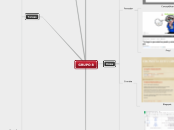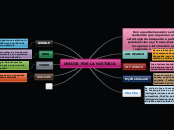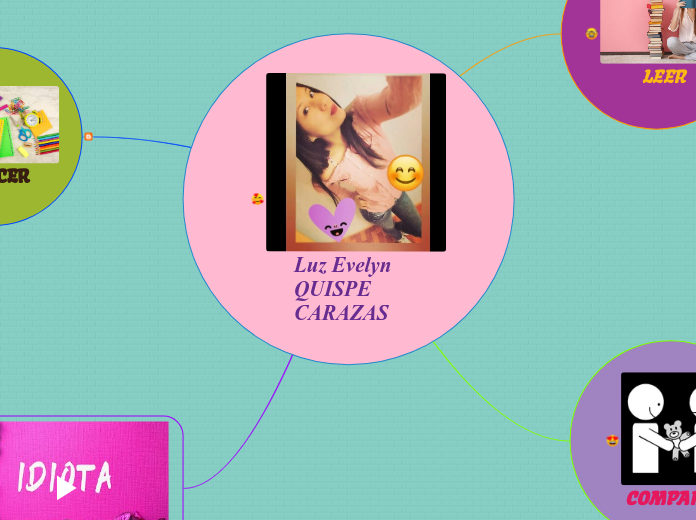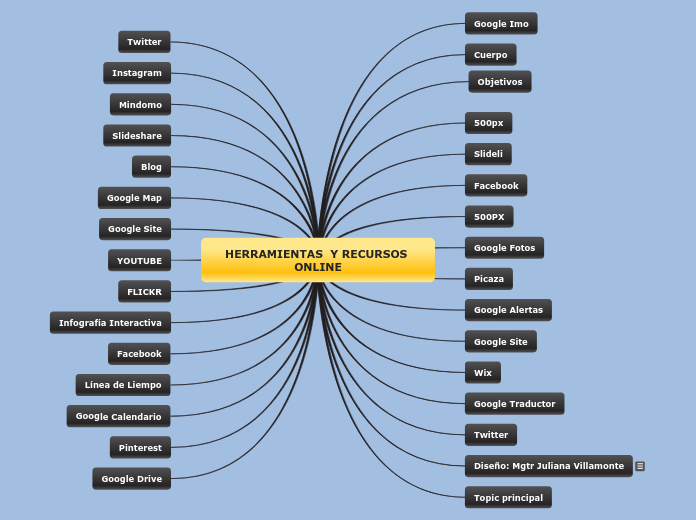HERRAMIENTAS WEBS
Tenses demonstrate the time of actions centered around the subject of the sentence. These actions are called verbs and change according to tenses.
Escritorios virtuales
Structure:
Had + Subject + been Verb-ING?
e.g. How long had they been living in London before moving here?
Servicios de Internet que integran y gestionan información a través de una página personalizada utilizando las tecnologías 2.0
Type in your own examples or you can also choose from the examples below.
Form of word "to be":
Had I been being?Had you been being?Had he/she/i been being?Had we been being?Had you been being?Had they been being?
Form of word "to have":
Had I been having?Had you been having?Had he/she/it been having?Had we been having?Had you been having?Had they been having?
Reúnen en un único espacio, sitios Web, blogs, cuentas de correo, fotos, videos, etc…
Añadir aplicaciones (witgets)
predefinidas
La agregación de canales
RSS de páginas Webe externas
Netvibes
Visualmente está
organizado en pestañas
El usuario añade y distribuye en cada pestaña
diversos módulos o widgets
Posee una parte pública y
otra privada
Tiene capacidad de actualización automática de los
contenidos a través de RSS
Symbaloo
Herramienta para organizar y clasificar nuestras páginas Web preferidas
Se pueden añadir enlaces,
suscripciones, emisoras de radio y
objetos digitales
Posee una interfaz clara y intuitiva. Cada escritorio o página se llama webmix
Diigo
Present Perfect Continuous is used:
- to describe an action that started in the past and has continued up to the present
- to describe an action that has just finished
Some adverbs used with Present Perfect Continuous:
- always
- only
- never
- ever
- still
- just
Structure:
Have/ has + Subject + been Verb-ING?
e.g. How long has he been learning German?
Es una herramienta para administrar el “conocimiento (información)” en la nube.
Red social
Type in your own examples or you can also choose from the examples below.
Form of word "to be":
Have I been being?Have you been being?Has he/she/it been being?Have we been being?Have you been being?Have they been being?
Form of word "to have":
Have I been having?Have you been having?Has he/she/it been having?Have we been having?Have you been having?Have they been having?
'
Se pueden crear listas de enlaces sobre un tema en particular
Structure:
Subject + haven’t/hasn’t been + Verb-ING
e.g. She hasn’t been playing tennis for a long time.
Se pueden crear grupos donde compartir y comentar los enlaces
Type in your own examples or you can also choose from the examples below.
Form of word "to be":
I have not been beingYou have not been beingHe/She/It has not been beingWe have not been beingYou have not been beingThey have not been being
Form of word "to have":
I have not been havingYou have not been havingHe/She/It has not been havingWe have not been havingYou have not been havingThey have not been having
Servicio de marcadores sociales que permite guardar, organitizar y compartir enlaces con otros usuarios
Structure:
Subject + have/ has been + Verb-ING
e.g. They have been learning French for two years.
Permite resaltar párrafos y añadir notas de las páginas visitadas
Type in your own examples or you can also choose from the examples below.
Form of verb 'to be':
I have been beingYou have been beingHe/She/It has been beingWe have been beingYou have been beingThey have been being
Form of verb 'to have':
I have been havingYou have been havingHe/She/It has been havingWe have been havingYou have been havingThey have been having
Marcadores sociales
There are four Future tenses:
- Future Simple ('with Will' and 'with Going to')
- Future Continuous
- Future Perfect Simple
- Future Perfect Continuous
Se puede añadir comentarios para describir los sitios Web
Clasificación de los enlaces mediante etiquetas asignadas por los usuarios (tags o palabras clave)
Future Perfect Simple is used for:
- an action that will be finished by a particular time in the future
- an action that starts before and continues up to another action or time in the future
- an action that will finish before a certain time in the future, but it is not known exactly when
Adverb used with Future Continuous:
- tomorrow (e.g. tomorrow by 7)
Funciona como una red social (siguiendo y seguidores)
Structure:
Will + Subject + Have + Past Participle?
e.g. Will you have met your colleague by this time tomorrow?
Permite descubrir usuarios con intereses similares
Structure:
Subject + Won’t Have + Past Participle
e.g. I won’t have met my friend form United States by this time tomorrow.
Suscripción RSS a nuevos enlaces de un usuario, nuevos enlaces a una etiqueta
Type in your own examples or you can also choose from the examples below.
Form of word "to be":
I will not have beenYou will not have beenHe/She/It will not have beenWe will not have beenYou will not have beenThey will not have been
Form of word "to have":
I will not have hadYou will not have hadHe will not have hadWe will not have hadYou will not have hadThey will not have had
Acceso a nuestros enlaces favoritos desde cualquier equipo
Future Continuous is used:
- for an action that is likely to happen in the future and continue for an expected length of time
- for an action that will be in progress at some point in the future
- for action verbs (e.g. running)
- for predictions about future events
Adverb used with Future Continuous:
- tomorrow (e.g. tomorrow at 5 o'clock)
Se puede consultar y establecer vínculos con otros usuarios
Structure:
Subject + Will Be + Verb-ING
e.g. You will be having fun at the party.
Sindicación de contenidos
(RSS)
Present Perfect is used for:
- an action that occurred at a time which is indefinite and has its effect on the subject
- an action that occurred many times and has the possibility to occur in the present/future
- an action that began in the past and is still going on in the present
Some adverbs used with Present Perfect:
- just
- already
- yet
- for
- never/ever
- up to now
Cuando aparecen sus símbolos en un blog, wiki, podcast, web, quiere decir que dispone de "canal de sindicación ” y por tanto es posible suscribirse a él y recibir información de sus nuevos titulares y contenidos
Structure:
Subject + haven’t (have not)/ hasn’t (has not) + Past Participle
e.g. She hasn’t finished the letter.
Permite visualizar los contenidos sindicados a través de un programa "agregador de feeds", como Feedly, Netvibes Netvibes o Symbaloo
Type in your own examples or you can also choose from the examples below.
Form of word "to be":
I have not beenYou have not beenHe/She/It has not beenWe have not beenYou have not beenThey have not been
Form of word "to have":
I have not hadYou have not hadHe has not hadWe have not hadYou have not hadThey have not had
RSS, ReallySimplySyndication=
Rich SiteSummary; ATOM; XML).
Structure:
Subject + have/ has + Past Participle (3rd Form of the Verb)
e.g. She has finished the letter.
Sistema de suscripción de contenido en los sitios Web preferidos sin tener que invertir tiempo en visitarlos
Type in your own examples or you can also choose from the examples below.
Form of verb 'to be':
I have beenYou have beenHe/She/It has beenWe have beenYou have beenThey have been
Form of verb 'to have':
I have hadYou have hadHe/She/It has hadWe have hadYou have hadThey have had
Calendar
Past Perfect Continuous is used:
- for an action that started in the past and continued up to another point in the past
- to show cause and effect
Some adverbs used with Past Perfect Continuous:
- since (e.g. since yesterday)
- for (e.g. for 10 years, for 6 months)
Se puede compartir los calendarios otorgando
diferentes niveles de permisos
Permite tener varios calendarios diferenciados por colores
Structure:
Subject + hadn’t been/had not been + Verb-ING
e.g. I was tired because I hadn't been sleeping.
Agenda online para compartir más fácilmente citas, eventos y acontecimientos con otras personas
Structure:
Subject + had been + Verb-ING
e.g. They had been talking for over an hour before I arrived.
Drive y Docs
There are four Past tenses:
- Past Simple
- Past Continuous
- Past Perfect Simple
- Past Perfect Continuous
Servicio de alojamiento de archivos en línea que
almacena 5 GB de contenido y permite compartir cualquier tipo de archivo multimedia
Past Perfect Simple is used for:
- an action that began in the past and is still going on at the moment of speaking
- an action that continued before and after another action
- a change of mind
- an action happening repeatedly in the past
The Past Perfect tense is not normally used alone. It is used to denote the earlier of two past actions. We use Past Simple for the latter action.
Some adverbs used with Past Perfect Simple:
- already, before, ever, never
- once, twice, yet
- just, up to then
- for, since
Incluye Docs: herramienta que permite crear, subir y diseñar trabajos digitales
Plataforma en línea a la que se puede acceder desde cualquier dispositivo con acceso a Internet (móviles, tabletas )
Structure:
Subject + had + Past Participle
e.g. They had already met Julia before the party.
Subtopic
Google Apps for Education
Past simple expresses:
- an action that happened in the past and has no connection with the present
- an action that happened once in the past
- an action that happened regularly in the past
- an action that was true for some time in the past
- an event or action that already occurred
- an action that is finite - has both a starting and a stopping point
Some adverbs used with Past Simple:
- yesterday
- last month, last year
- ago (e.g. two days ago)
- in (e.g. in 1997)
- never, always, seldom, often, frequently, occasionally, once, twice
Incluyen aplicaciones avanzadas de colaboración y comunicación
Structure:
Subject + Verb in Past Simple (2nd form)
e.g. They lived in Spain three years ago.
Calendar: Agenda, reuniones online.
Calendarios compartidos
Drive: Sincroniza documentos. Guarda
y compartir cualquier tipo de documento
Structure:
Did + subject + Base Form of the Verb?
e.g. Where did you meet her?
Docs: Documentos online.
Colaboración en tiempo real
Gmail: Correo profesional. 25 GB de
espacio total espacio total y 25 MG el mensaje
Structure:
Subject + did not/didn’t + Base Form of the Verb
e.g. They didn’t like my food.
Introducción
There are four Present tenses:
- Present Simple
- Present Continuous
- Present Perfect
- Present Perfect Continuous
Sencillez de acceso y utilización de editores de fácil uso
Present Continuous is used to indicate the ongoing time (now).
Some adverbs used with Present Continuous:
- now, right now
- at this moment
- at the moment
- continually
- perpetually
- this year
- this season
- forever
Permite establecer redes de investigadores redes de investigadores sobre la misma temática
Structure:
BE + Subject + Verb-ING?
Are you eating now?
Mejoran las competencias digitales desde búsqueda y selección de proceso para convertirla en conocimiento, hasta su publicación y transmisión en diversos soportes
Structure:
Subject + BE not + Verb-ING
e.g. You are not eating now.
Facilidad de remezclar la web para su publicación en otras herramientas (blogs, wikis, páginas web, etc)
Structure:
Subject + BE (am/is/are) + Verb-ING
e.g. You are eating now.
Alojamiento de los documentos en la nube, permitiendo su acceso desde cualquier lugar y evitando pérdidas
Present Simple is used for:
- habits
- general truths
- repeated actions of events
- fixed arrangements/timetables
- feelings/opinions/beliefs
- instructions.
Some adverbs used with Present Simple:
- always
- usually
- seldom
- never
- sometimes
- often
- frequently, generally
- habitually, occasionally
- once, twice
